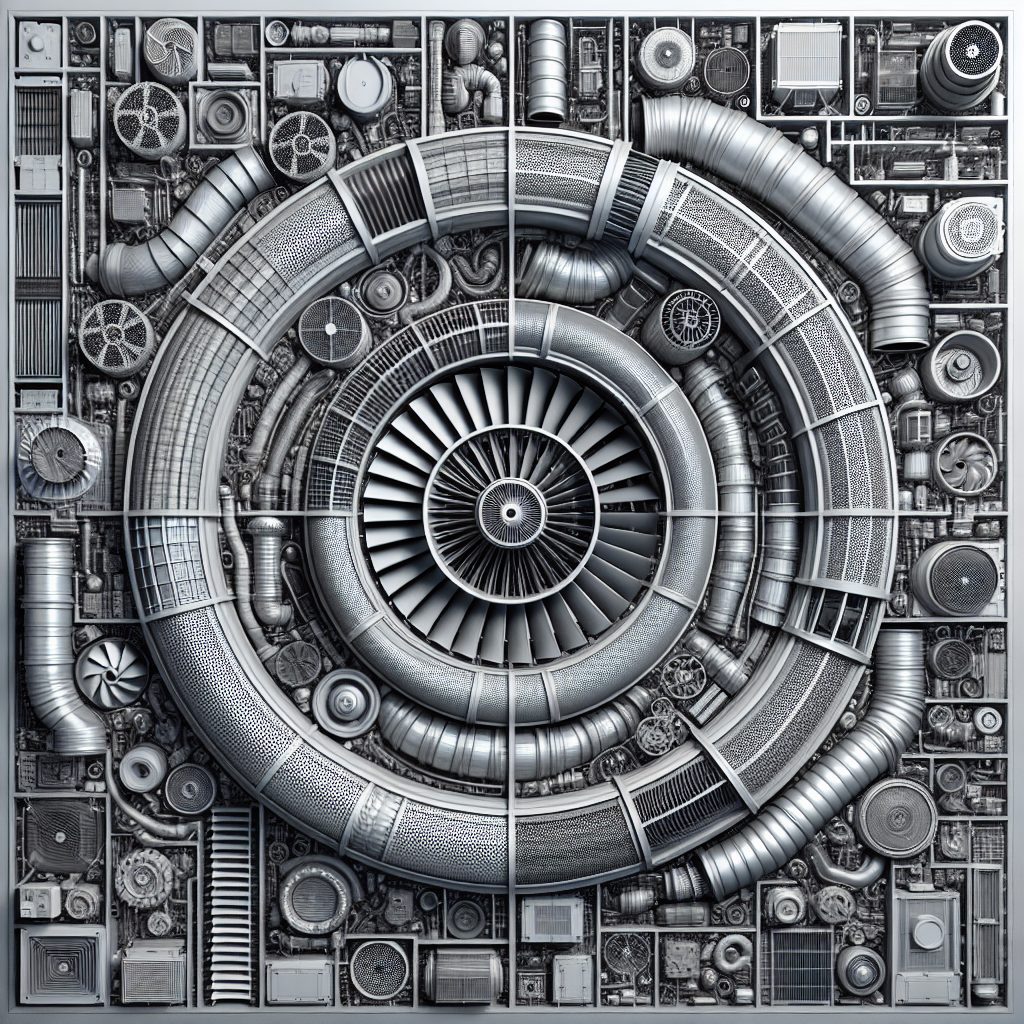
Ventilation Systems are designed to ensure fresh air is brought into a home, commercial building or production facility while stale air is removed. The goal is to ensure a safe and healthy breathing environment but can also involve optimizing temperature and humidity, reducing odors, or controlling energy use. A variety of systems have evolved to get the job done, each with their own unique advantages and disadvantages. High-efficiency systems offer some of the most cost-efficient solutions and benefit from continuous technological advances. In the next section, we will discuss the different types of ventilation systems and explore their respective benefits.
From passive to active systems, the type of ventilation choice should be based on a combination of factors such as the building type, applications, construction, and budget. Natural ventilation systems use outside air to cool down interior spaces for free; in contrast, mechanical ventilation systems use fans and other HVAC equipment to move air. More modern ventilation systems are increasingly incorporating smart technologies, reducing energy bills and improving indoor air quality and comfort. In the next section, we will compare these different types of ventilation and their features in more detail.
Key Takeaways
1. Ventilation systems are an important aspect of good indoor air quality and public health in buildings, as they increase air circulation and filter out pollutants to improve air quality.
2. Mechanical ventilation is the most common system used as it typically uses powered fans to force air through filters and then circulate it around the building.
3. Building codes and regulations usually dictate the requirements under which ventilation systems must work, taking into account indoor air quality, comfort levels, energy efficiency, and fire safety.
4. Natural ventilation systems use the action of air flowing through windows and other openings rather than fans to move the air, helping to reduce energy costs.
5. Proper maintenance and cleaning of ventilation systems are important to maintain optimal performance and efficiency.
What Are The Benefits Of Installing Ventilation Systems?
Ventilation systems are becoming increasingly popular in homes and commercial buildings due to their numerous advantages. Installing a ventilation system can improve the air quality of the building, reduce energy costs, reduce exposure to hazardous materials, and improve safety and comfort.
How Do Ventilation Systems Work?
Ventilation systems are designed to draw fresh air into a building by pushing stale air out. This can be accomplished through a number of methods, including natural ventilation, mechanical ventilation, and hybrid ventilation. Natural ventilation relies on the natural motion of air currents due to differences in temperature, wind pressure, and the shape of the building. Mechanical ventilation is an automated system that uses fans to push air out of the building and draw new air in. Hybrid ventilation combines both natural and mechanical systems to achieve the best air exchange rate.
What Are the Different Types of Ventilation Systems?
Ventilation systems are available in a variety of types and sizes, with each type designed for specific applications. The most common types of residential and commercial ventilation systems include attic fans, exhaust fans, bathroom fans, and whole-house fans. Attic fans are used to remove hot air from the attic and reduce heat transfer to the living space below, while exhaust fans are used to remove odors, smoke, and moisture from bathrooms, kitchens, and other areas. Bathroom fans are designed to remove moisture and odors from bathrooms, while whole-house fans are designed to provide cooling and air exchange for the entire home.
What Are the Benefits of Installing a Ventilation System?
Installing a ventilation system can provide numerous benefits to homeowners and commercial buildings, such as improved air quality, reduced energy costs, reduced exposure to hazardous materials, improved safety and comfort, and a clean and healthy environment.
How Can I Make Sure My Ventilation System Is Working Properly?
To make sure the ventilation system is working properly, it is important to properly maintain and inspect the system. Make sure the filters are clean and in good condition, and the system regularly inspected by a qualified contractor.
How Can I Find a Qualified Contractor for My Ventilation System?
The best way to find a qualified contractor for your ventilation system is to contact a reputable, local HVAC contractor. HVAC contractors should be licensed, insured, and knowledgeable in the installation and maintenance of ventilation systems. It is also important to check the contractor’s references, as well as their experience in working with ventilation systems.
5 Tips For Maintaining Your Ventilation System
1. Change the filters regularly according to the manufacturer’s recommendations.
2. Schedule regular inspections and maintenance with a qualified HVAC contractor.
3. Make sure that the exhaust ducts are clear and unobstructed.
4. Clean the vents and grilles to remove any dust or debris.
5. Make sure the fans run continuously and are properly balanced for the room size.
What is a ventilation system?
A ventilation system is a mechanical system used to bring fresh air from outside into an indoor space. It helps circulate air, creates a healthy environment, and helps regulate the temperature of a space. Ventilation systems come in a variety of types and sizes, and typically rely on fans to help circulate the air through ductwork.
What are the benefits of a ventilation system?
Ventilation systems are beneficial in many ways. They help to reduce the risk of airborne illnesses by exchanging stale indoor air with fresh air from outside. This process helps improve air quality and can aid in reducing the presence of allergens, dust, and pollutants in a home or commercial space. Additionally, ventilation systems help regulate the temperature of a room, reducing energy costs by using the outside air to cool or heat a space, depending on the season.
How can I tell if my space needs a ventilation system?
There are several indicators that indicate a space is in need of a ventilation system. These may include a musty odor in the space, condensation or dampness near windows or on walls, difficulty breathing while inside, or mold or mildew growth. Additionally, if the space is generally stuffy and not comfortable, a ventilation system may be beneficial.
How much do ventilation systems cost?
The cost of a ventilation system depends on several factors such as the type and size of the system, where it is being installed, and the materials and accessories that are required. Generally, the cost of a simple, single-room ventilation system will be between $1200 and $2500, while a more complex system for a larger area may cost up to $5000 or more.
Which type of ventilation system is best for me?
The type of ventilation system that is best for any given space depends on the size of the space, as well as the climate and environment of the area. In general, a positive pressure ventilation system is ideal for colder climates as it will bring fresh air in while removing stale air out. For warmer climates, an exhausting ventilation system may be more beneficial as it will bring in fresh air while exhausting hot air out.
How often do I have to maintain and clean my ventilation system?
It is recommended to maintain and clean the ventilation system on a regular basis in order to ensure it is working properly. This may include changing the filters as needed, inspecting ductwork for problems, and possibly replacing certain parts of the system if they are no longer functioning optimally. To be safe, this should occur at least once a year in order to prevent any issues.
Are ventilation systems noisy?
This depends on the type of ventilation system installed. Generally, the fan in a ventilation system is what creates the most noise, and there are some systems that have specialized fan motors designed to be as quiet as possible. Additionally, soundproofing materials, such as insulation, can be installed around the fan to help reduce the noise level.
How can I make my ventilation system more energy efficient?
There are several ways to increase the efficiency of a ventilation system. Some of these may include installing a smart thermostat to control the temperature and humidity levels, ensuring air ducts are well insulated, and installing a timer to help regulate when the system is running or not. Additionally, using Energy Star-rated fans, motors, and filters can help to reduce the system’s energy consumption.
Can I install a ventilation system on my own?
The installation of a ventilation system should always be handled by a professional. It is a complex process that requires the knowledge and skill of an experienced technician in order to be done correctly. Additionally, many ventilation systems require special wiring and permits, which a professional can handle.
Final Thought
Ventilation systems can be incredibly beneficial when it comes to improving air quality and creating a healthier, more comfortable environment. However, it is important to understand the different types and sizes of ventilation systems, and to have a professional installer handle the installation and maintenance process in order to ensure optimal results. With a little bit of research and care, ventilations systems can improve your quality of life greatly.
Overall, ventilation systems can be a great addition to any home or commercial building, as they offer a variety of benefits and can help to create a healthier, more comfortable living environment. It is important to make sure to take your time when researching ventilation systems and to find one that will best suit the size and unique needs of your space. With a professional installer taking care of the installation, you can rest assured that your new system will function properly and efficiently for years to come.



